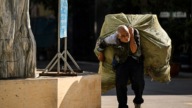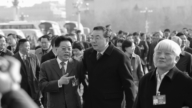【新唐人2013年07月27日訊】在中國做生意要小心了,因為有可能你一不小心就會鋃鐺入獄。近來,媒體盤點中國企業家可能惹上的十大罪狀,中國企業家面臨著複雜的法律環境。因此有人說,中國的企業家不是在監獄,就是在通往監獄的路上。
湖南前民營企業家曾成傑悄然無聲的被處死,在中國企業界引起震撼。
曾成傑在被收押三個月後,他的資產被當局強行處置,資產價值從最初的評估報告23.8億,層層遞減,最終以3.3億元出讓給湖南省政府下屬的國有企業,而關鍵的資產評估報告始終沒有對外公布。
京衡律師集團董事長兼主任陳有西在媒體指出,按照中共現行法律邏輯和罪名,中國企業家人人都是帶罪之身,只要經營五到十年,列上五個罪名,量刑搞到死刑一點問題沒有。如果想用公檢法的力量來剝奪一個企業、一個富人的財富,只是幾分鐘的事。
最近,有媒體整理出懸在中國企業家頭上的「十宗罪」,一,虛報註冊資本罪,二,虛假出資罪,三,抽逃出資罪,四,徇私舞弊低價折股、出售國有資產罪,五,私分國有資產罪,六,集資詐騙罪,七,非法吸收公眾存款罪,八,高利轉貸罪,九,虛報破產罪,十,非法經營罪。
山東律師付永剛:「是制度化的問題,是大環境之下的問題,所以如果要是完全按照法律辦事,在中國,就是企業想要搞起來,幾乎可以說是天方夜譚, 總之,完全靠合法的去做,很難形成一個大的企業,一個發展有前景的企業。」
有經濟學家說,在中國,經濟問題就是政治問題。
河北大午集團監事長孫大午:「肯定的,在這種體制下,很多人都沒有安全感,這是很正常的,不光是企業家,就是各行各業人們都有這種不確定性,就是我們現在很多法律的東西,它體現不出它的公正性來。」
2003年,當局以「河北大午集團」監事長孫大午向三千多戶農民借款一億八千多萬元,將他誘捕收押,罪名是「非法集資」。
孫大午:「當時我出來以後,被判有期徒刑3年,緩刑4年的時候我不能再做法定代表人,不能再當董事長。」
出獄後的孫大午,不願自己幼小的兒子繼承企業,可能在複雜的環境下遭受莫須有罪名。所以他決定傚法隋朝的三朝六部制,和英國的君主立憲制,創立了「私企立憲、三權分立」。
孫大午:「讓我的兒子接班呢,還駕馭不了,當時。所以就發明瞭這麼一個大家都接受的制度,我們那個制度是搞民主選舉董事長和總經理的。」
所謂「私企立憲」,就是民主選舉、民主監督、民主決策、民主治理﹔「三權分立」,就是設立理事會、董事會、監事會,分別掌握經營權、決策權、所有權。
企業家要在中國生存下去,就必須走出一條路來。孫大午認為,民主制度是讓資本說話,讓工人說話,是一種勞資共和的體制,是一種價值的體現。
孫大午助理:「當時也是為了解決諸多的問題,企業就這套制度之下,雖然可能發展的速度會受到限制,但是也確保了它的穩定,其實他不是在辦企業,很多媒體都這樣評論他,他辦的是一種社會,他是一種企業辦社會的理念。」
媒體報導指出,盤點中國企業家的十大罪狀,都在通往監獄路上?
網友認為,說得太有理了。在中國90%以上的民營企業的老闆一開始成立公司,就有十大罪狀。凡是創業者都是政府掌中的玩偶,盤中的餐,想讓你進監獄,你一定會進監獄,想剝奪你的財產,馬上讓你成為窮光蛋。
採訪/朱智善 編輯/黃億美 後製/郭敬
Chinese Communist Party Legal System Set Up To Convict
Chinese Business Owners To Getting Their Assets
If you have a business in China, then you must be
very careful not to be put in prison.
A recent media report summarizes “ten most
likely crimes” of Chinese entrepreneurs.
This shows what a complex legal environment
they have to face.
Hence comments that, for all Chinese business owners,
they are either in prison or on their way there.
The quiet execution of Hunan private entrepreneur Zeng
Chengjie, has shocked China’s whole business circle.
Three months after being arrested, Zeng’s company assets
were forcibly seized by the Chinese Communist Party (CCP).
Zeng’s company was finally appraised at a value of 330 million,
greatly reduced from the previous value of 2.38 billion.
Then it was sold to an affiliated state-owned company
of Hunan provincial government at the deflated price.
However, the key assets evaluation report has never
been open to the public.
President of Jingheng Lawyer Group,
Chen Youxi told media that,
following the logic of the CCP current legal system and
its charges, every Chinese entrepreneur is guilty.
If your business is 5 to 10 years old, they can easily sentence
you to death by cooking up at least five charges against you.
All your assets can be removed in minutes if public security,
courts and judicial systems work together to do that.
Recently, some media summarized a “top ten list
of charges” against Chinese entrepreneurs.
They are: falsely reporting registered capital.
Second, false capital contribution.
Third, surreptitiously withdrawing contributed capital.
Fourth, rebating and selling government-owned property at
a lower price. Fifth, unauthorized partition of state property.
Sixth, fraudulent fund raising. Seventh, illegally absorbing
public savings. Eighth, relenting at high interest rates.
Ninth, false bankruptcy. Tenth, illegal business operation.
Fu Yonggang, Shandong lawyer: ”The problem lies in
the whole regime, or the environment.
If completely following China’s law, it would be
impossible for any company to prosper.
In a word, it is very difficult to develop into a big
or promising business only through legal operations.”
A comment from economists says that, in China
any economic issue is also a political issue.
Sun Dawu, Supervisor Board Chairman of Dawu Group:
”Without doubt, many people have no sense of security.
This is quite normal not only in business circles.
Every field or industry has the same uncertainty about their
future; the rules of our current law system show no justice.”
In 2003, Sun Dawu was arrested by
the CCP for “illegal fund raising”.
They claimed that Sun had illegally collected 180
million Yuan from over 3000 households in the country.
Sun Dawu: ”At that time I was sentenced to three year
imprisonment with a reprieve.
After that in the fourth year I was no longer able to
be business representative or board chairman.”
After being released, Sun Dawu worried that his young son
might also be subject to fabricated charges and so became
unwilling for him to succeed as the company owner.
Finally Sun decided to follow the Three Departments and
Six Ministries system of Dynasty Sui, and the Constitutional
Monarchy of the British government.
He created a constitutional system of
“separation of powers” for his private company.
Sun Dawu: ”My son still cannot operate the
whole business. So then I created such a system.
In that system we run democratic elections for board
chairman and executive manager.”
Sun’s “Constitutionalism of private company operation” is
democracy in election, supervision, decisions, management.
His “separation of powers” refers to Board of Management,
Director and Supervisor.
The three boards have powers in management,
decisions and proprietorship, respectively.
To survive in China, entrepreneurs have to
find their own ways.
Sun Dawu believes democracy allows both sponsors
and workers to speak for themselves.
It is a regime of republicanism between labor and capital,
as well as the embodiment of a value system.
Sun Dawu’s assistant: ”Then we had to
solve many problems.
Such a system may limit growth of our company,
but it also ensures its stability.
As commented by many media reports,
Sun Dawu is not running a company.
His idea is to run a social system in the form of business.”
A Chinese media report also comments that, all Chinese
business owners are on their way into prison.
According to their “ten most likely crimes” list.
Chinese netizens show strong consent with the report,
saying that
over 90% private company owners have had those crimes
on their shoulder since the very first day of their business.
Entrepreneurs are simply offering themselves to the CCP.
You will be either put into prison or deprived of
all assets whenever one they wish to do.




























